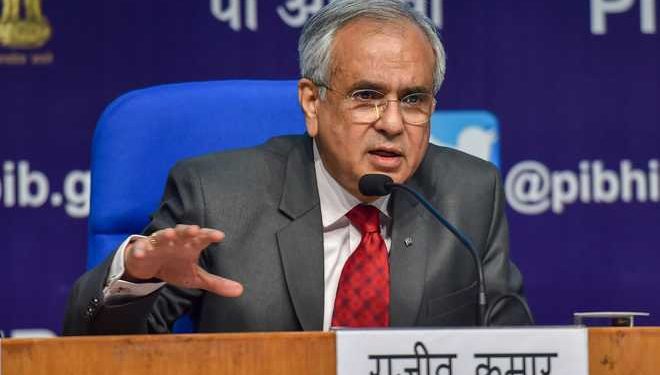New York: India will achieve a GDP growth of 8 per cent plus from fiscal year 2020-2021 onwards as the structural reform measures like the GST are set to yield the intended benefits, NITI Aayog Vice Chairman Rajiv Kumar has said.
The eminent economist was in the city for the High Level Political Forum Ministerial Meeting on Sustainable Development Goals at the United Nations Headquarters. During the visit, he delivered the keynote address at the ‘India Investment Seminar’ held at the Consulate General of India, New York.
Kumar stressed that in the next five years, the Modi government is focused on accelerating growth from the current about 7 per cent to more than 8 per cent that will propel the country to easily achieving the target of becoming a 5 trillion dollar economy.
“I personally think that in the fiscal year 2020-2021 onwards, we will achieve higher than 8 per cent growth, (continuing) then for the next many years. It is just a fact of (growth) taking off,” Kumar told PTI in an exclusive interview.
“The foundation has been laid and the transformation has begun with the passing of structural reforms like the Goods and Services Tax, Insolvency and Bankruptcy Code. These have taken their time to settle down and now they’ll produce the benefits,” Kumar said.
“We have the potential to grow at double digit growth rates,” he said. On the issue of job creation, Kumar emphasised that a very large number of jobs have been generated in the country in the last five years.
“If it was always a jobless growth, then that would have shown up in social strife and social tensions and surely would have meant that this government would not have been re-elected,” he said, adding that the re-election of Prime Minister Narendra Modi-led government shows that there is a level of satisfaction with the government’s performance.
Kumar highlighted that the Union Budget, presented earlier this month, has taken big steps forward for facilitating and further improving ease of doing business by liberalising the inflows of the FDI.
“This budget is a paradigm shift in saying that we will achieve accelerated growth and job generation but with the primacy of private investment. That is what our focus is – that will then generate the jobs,” he said.
He said that, at the NITI Aayog, the most important focus is on improving private investment by improving the investment climate, accelerating growth, generating jobs, creating policies for that and at the same time ensuring through social programmes that benefits reach the bottom of the pyramid and to the last person standing in the queue.
Kumar acknowledged that while a lot has been achieved through programmes such as Swachh Bharat Mission and Ayushman Bharat, challenges remain in a country of 1.3 billion people – from a water crisis, shortage of energy in parts of the country, pollution and need to increase female participant rates.






































